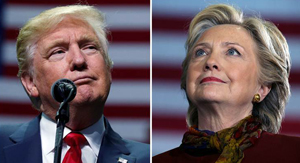Washington, Nov 8: Millions of Americans today lined up at polling stations to elect either the country's first woman president in its 240-year history or a political outsider in the White House as the race between Hillary Clinton and his rival Donald Trump remain too close to call.
Fighting for every single vote at stake, Democratic nominee Clinton and her Republican rival Trump made their last minute forceful argument before the American people with their own vision for the world's largest economy, ending the ugliest presidential campaign in US history.
Clinton, 69, was joined by husband Bill as she addressed a massive rally in Raleigh in the key battle ground state of North Carolina, which was entertained by Lady Gaga.
Trump, 70, made a last minute scheduled stop in Michigan to address thousands of his supporters hoping that he might be able to swing this state from the Democrats.
The two rallies ended around 1 AM (local time), just six hours before opening of the polling booths in the East Coast.
The first ballots were cast in a sleepy hamlet in New Hampshire, traditionally the first in the nation to vote on Election Day, with Clinton winning the contest.
Clinton registered her first 'win' in the 2016 elections by four votes to two against Trump soon after midnight in the remote Dixville Notch, New Hampshire.
While Clinton is close to victory mark, Trump must win most of the battleground states to clinch the magic figure of 270 Electoral College votes.
Arizona (11), Florida (29), Nevada (6), Nebraska 2nd Congressional District (1), New Hampshire (4) and North Carolina (15) are key battleground states.
An estimated 200 million people are eligible to cast their votes to elect the country's 45th president along with hundreds of Congressmen and members of state legislatures and local civic bodies.
A record 42 million have already voted using the "early voting" provision of the American electoral system, surpassing the 2012 record when 32.3 million people had voted in advance.
Clinton and Trump crisscrossed several stops in key battleground states on the final day of campaigning which the US media has termed as the ugliest and the most divisive.
"This election is basically between division and unity in our country. It's between strong and steady leadership or a loose cannon who could put everything at risk. It is between an economy that works for everyone or one that is even more stacked for those at the top," Clinton told a cheering crowd in Raleigh, North Carolina.
"None of us, none of us, want to wake up on Wednesday morning and wish we had done more," she said, which she repeated in her other election rallies including the one in Philadelphia, which was also addressed by US President Barack Obama and First Lady Michelle.
Latest poll indicated that while the election seems to have tightened in the last few days, Clinton maintains a slight lead over Trump. Almost all major polls are predicting a victory for Clinton, but Trump appeared confident of winning some of the key battleground states and thus wrest the White House from the Democrats after a gap of eight years.
"Do you want America to be ruled by the corrupt political class. Or do you want to be ruled by you, the people," Trump said in Michigan.
"Political establishment has brought distraction of factories and jobs," Trump said.
"Tomorrow the working class will strike back," he said in New Hampshire and in Michigan he declared "today is the Independence Day".
Trump kicked off his Monday engagements with a rally in Florida.
"We're going to be one country. We're not going to be a divided nation anymore, we're a divided nation. We are a divided nation. We will also cancel billions and billions of dollars in global warming payments to the United Nations where those payments disappear. And we're going to use all that money to invest in the infrastructure and we could even say the environmental infrastructure of our country," Trump said.
Trump would be spending the election day in New York. His 'victory rally' has been schedule at a hotel in New York, a few kilometres away from the 'victory rally' of Clinton.
The Republican presidential nominee's election journey has been sensational as from a rank political outsider he has come close to becoming the US President.
This year, the Republican field began with a long list of 17 candidates, including Indian-origin Louisiana governor Bobby Jindal, New Jersey Governor Chris Christie and former Florida governor Jeb Bush. The Democratic field, on the other hand, was not as crowded, with just Hillary Clinton and Senator Bernie Sanders in the race.
Unlike India, in the US campaigning can be done even as voting continues.
Every state would start counting the votes as polling concludes.
One of the main highlight of the last few weeks has been the electioneering blitz by Obama.
In the last 10 days, he addressed as many as 17 rallies -- rare for an outgoing President.
In the last phase of the campaign, the Clinton campaign also brought in popular singers, which Trump alleged was a move to attract crowd.
The two campaigns have different theme. While 'Make America Great Again' is the theme of Trump, 'Stronger Together' is Clinton's slogan.
Both the candidates have said they would accept the results of the elections, but reserve the right to challenge in case of close results. The new president would be sworn in on January 20.
Till then the winner would be called president-elect and would have a transition team in place working from Washington.





Comments
Add new comment